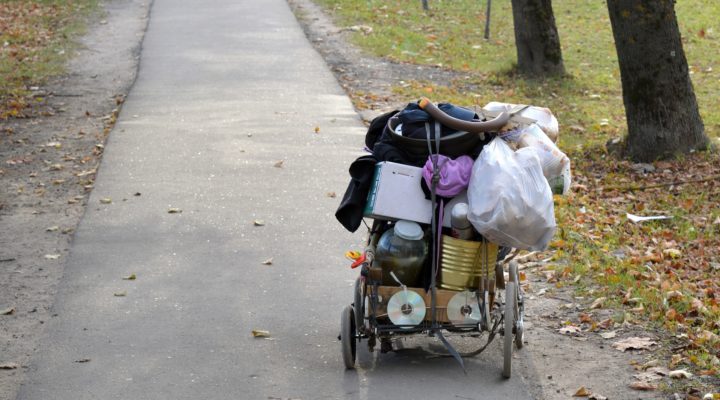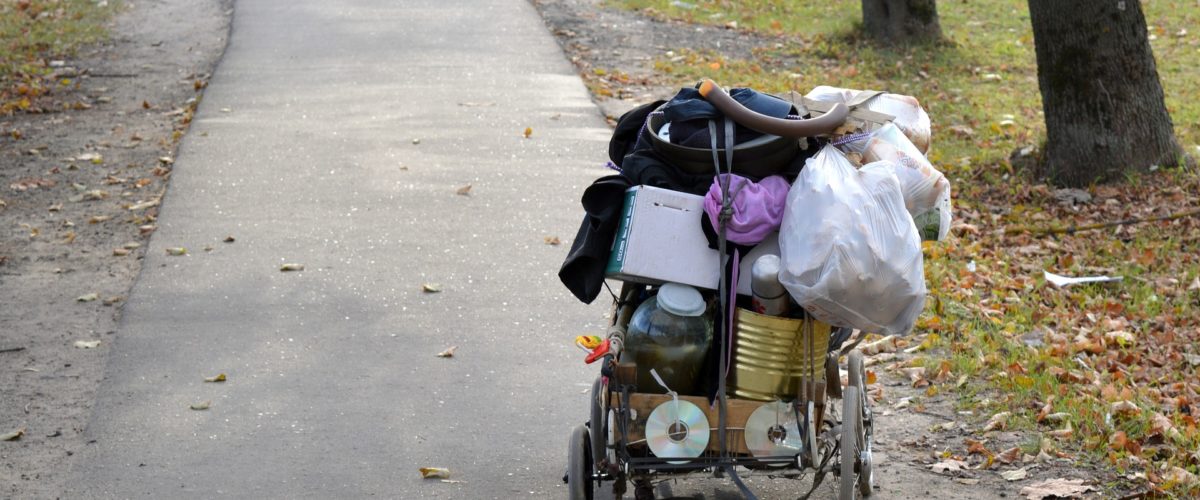 “The world may be mean, but people don’t have to be, not if they refuse.”
“The world may be mean, but people don’t have to be, not if they refuse.”
— Colson Whitehead, The Underground Railroad
Dolores is walking down Tryon Street this morning, at the end of the morning rush. With her, in two rolling carts, is everything she owns. She appears to have carefully curated those things she carries with her, and she clearly goes to some effort to keep them in good order. The cart is lined in black plastic, concealing its contents. The top of the plastic, on each cart, is covered in a purple shawl tied, taut to the frame of her cart to keep everything in, and to keep her life concealed from public consumption. Adorning each purple shawl is a leopard-print kerchief. Dolores is down on her luck, but she has style. The world has not yet robbed her of her flair.
Dolores’s gait is a little wobbly. Probably from too many years pushing her household around downtown, one imagines, as Dorothy of Kansas without the aid of a cyclone. But why imagine only that? Who knows where she has been? Perhaps she was a nurse, her knees now fragile from too many hours on her feet in an operating room. Maybe she was a teacher who inspired the imaginations of hundreds of students, students who, if they knew she was here, would shower her with kindness. Maybe she was a high-powered attorney who woke up one morning, and failing to recognize the person in the mirror, decided to give all of the prestige and money away. She could have been an Olympic athlete whose arthritic hips scratched her career too soon. She’s carrying some genius with her, for sure, though it remains hidden.
When Dolores reaches Fourth Street, she faces a choice. Given the brief interval to cross, plus the traffic and her cumbersome load and her unsteady gait, only one cart can cross at a time. She must trust half of her possessions to the goodness of the world, leaving one cart on the corner while crossing. For a few moments, as she crosses back to retrieve the second cart, she will be separated from everything she has in the world except herself. The world hustles by, heedless of Dolores. In the towers above, accountants punch numbers into spreadsheets, unaware of the important calculation happening at the street level.
David pops out of his building. After coming in early this morning to work at the bank, he is ready for sunlight and a cup of coffee. He put on one of his new suits this morning. It just got returned from the tailor, and he feels sharp in it. He’s at work early, dressed for the job he wants. David earned this coffee break.
Tryon Street is busy. People fill the sidewalk. The hot dog man is setting up for the lunch rush. Delivery drivers unload into restaurants. A street preacher is already chirping, his voice not tired, though his sermon is. Cars, bikes, buses. There is plenty to see just on this corner.
As David heads across the street, what he sees is Dolores. He is not moving in her direction. Maybe the purple cloth catches his eye. Perhaps her slight stumble when she makes the first step off the sidewalk grabs his attention. For whatever reason, he sees her. He sees what is happening, and he decides coffee can wait. David bounces across the street, stopping Dolores in the middle of the intersection. They speak for a moment. Then he grabs the second cart, and just as the “Do Not Walk” hand stops flashing, delivers it safely across the street.
Traffic moves again. David heads for coffee. Dolores heads toward Third Street where she will face yet another decision. The endless hustle continues.
We live in an age where meanness has been enthroned. Here in North Carolina, we’ve been fighting the most recent outbreak for a half-dozen years, but the roots run deep, way back to the beginnings. And in Washington, well, the folks running the show have been taking note of our direction. They see cruelty with little consequence, and they cannot help but try it themselves. It is sport, complete with after-parties.
This cruelty is not new on this soil. It has always been, since the settlers arrived with their Doctrine of Discovery. Efforts to reconstruct opportunity and to promote the general welfare have risen up before, only to be met with new attempts to maintain racial and economic hierarchies. Reconstruction, following the Civil War, did not fail. It was destroyed by the “Redemption” movement, which could not bear the potential dismantling of the racial caste system. The Civil Rights Movement required more than a decade of resistance and organizing to win basic rights. The resistance to the Civil Rights Movement became the so-called “moral majority,” which shrouded violent policy and the destabilization of entire neighborhoods in talk about “virtue” and “family values.” So that an aspiring tyrant would follow a black president and a movement on the simple assertion that black lives matter is not a surprise. It is how America works.
And have mercy, white Christians keep propping up those attempts to move the culture in the basest direction. And not just propping them up. White Christians are driving the bus. We keep shrouding our worst impulses in our most sacred language, and pretending not to know.
Some days, I admit, this makes me hopeless. As a white Christian, I know this backward moral logic lives in me. And I know that I bear a significant responsibility for working with my people to undo, but my, we are a stiff-necked people who keep running from freedom back to Pharaoh.
But most days, I think that we can build on Dolores and David. Which is not to say that we can just be nice to each other and everything will be OK. But it is possible to craft policy in a way that makes the journey a bit easier for those who suffer. It is possible to build cities where by design we wind up in proximity to others on different journeys, and then to choose to lighten a load, rather than to avoid. We can elect folks like David, who did not try to grab Dolores or mock her, but instead honored her as a person with dignity. Better, we could elect Dolores, who knows exactly what policies are not working and why.
To reflect such character in policy and in interpersonal interaction would to be the way of love. It is a more excellent way.


